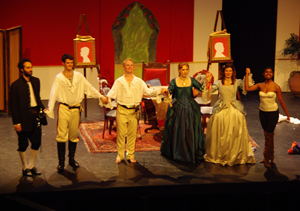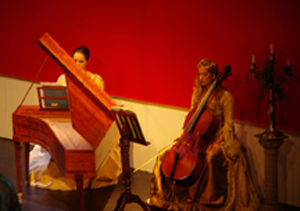Journal entries
Le Bon Journal
About
Search
Contact
Readers write
Show your support
Bon Journal
Cosi Fan Tutte, first production of Situation Opera
Mozart's Cosi Fan Tutte in Greenwich Theatre, London
As I was leaving the park in Canary Wharf, still chuckling after the splendid Royal Opera House performance of Mozart’s Marriage of Figaro broadcasted on the big screen, a young lady handed me a red leaflet for yet another Mozart opera, at the Greenwich Theatre the following week. What clever marketing, I thought. Opera goers are a minority. Catch them where they are found. Besides, who can tire of Mozart?
Here was my chance to see Cosi Fan Tutte a second time, after having the ill fortune of sitting behind several misbehaving chatterboxes who spoiled my very first opera experience nearly 15 years ago in Holland Park. My culture vulture date had chosen this comic opera as a safe bet. If I didn’t understand or like it, at least I would enjoy the music. The next opera he took me to was the very serious and tragic Katya Kabanova by Janacek whose music was too foreign for my digestion. Little did I know that I wouldn’t see another opera for another decade.


Photo credit: Matthew Pollard, Situation Opera
Opera is not for the faint-hearted, I had concluded. All my years of watching and playing percussion and piano in show-stopping musicals had not prepared me for opera until I started going to concerts of famous and beloved arias from different operas, performed out of context, like the way Classic FM radio selects an individual movement from a larger work.
As the date drew closer, I became anxious about attending such a lengthy opera, produced and performed by nobody I had ever heard of, staged in a theatre on the other side of London, requiring a long bus and train journey during rush hour traffic in the peak of the busiest tourist season. Would I be able to understand the three-hour opera? Would there be English subtitles to help me follow the Italian libretto? Since I had never heard of its producer --- Situation Opera Company or the Greenwich Theatre, I was concerned that I might not like it. The opportunity cost of my limited time in London was high: maybe there was another event more worthwhile, even one as simple as enjoying a warm summer evening outdoors with friends.
The latter was solved by persuading two friends to join me: a celebrated Scottish advertising guru traveling from Florida to Tuscany and an American marine biogeochemist on route from Utrecht to Atlanta. Unlike concerts which I’d happily attend alone, opera and theatre belong to that category of the shared experience ---- a gourmet meal that is best enjoyed together.
To ensure I got the maximum out of this evening, I googled “cosi fan tutte” which means “thus do all women” or “thus behave all women” but is usually translated as “women are like that.” The longer title “Così fan tutte, ossia La scuola degli amanti” translates to “Thus Do They All, or The School For Lovers.” It was the last of the three operas Mozart collaborated with the librettist Lorenzo Da Ponte, the other two being the Marriage of Figaro and Don Giovanni. I even found an English translation of the libretto which I dutifully printed from the Web.
After a quick dinner at a nearby restaurant, we rushed to buy the programme booklet before finding our seats. Later I would lament on not arriving earlier to read through the elaborate programme notes excellently written by the music director Marion Wood with input from the assistant director Clara Bradbury-Rance. Printed in a large readable font, it contained a concise synopsis of the two acts, history of the opera, biographies of the cast and crew, and the raison d’etre of Situation Opera. Good programme notes are essential to the concert-going experience.
As the lights dimmed, I found myself searching, if not, grasping for subtitles. There was none. Later I learned that putting up subtitles was a costly matter, involving the purchase of copyright of the English translation and hiring someone to man the operation of projecting the subtitles onto a screen on stage. It was too dark to read what I had printed earlier, and soon I understood why the English National Opera became an institution in its own right. Was it really necessary to understand the libretto, if the acting and the music communicated the story? In fact, everything else had to.
Cosi Fan Tutte is the classic tale of partner swapping. Two soldiers are in love with two sisters. An old philosopher named Alfonso claims that all women are fickle. The two young men wager that it’s not so. Together they plan their “experiment,” in which the men would pretend to be called to war, only to return disguised as mustachioed Albanian suitors. Alfonso enlists the help of the sisters’ maid, Despina in this farce. Many beautiful arias and duo’s later, the ladies nearly marry the wrong partners. Just in time, the farce is revealed, and all live happily ever after.
I could breakdown the opera into the stage set-up, lighting and props; the singers and their make-up, acting, and singing; the musicians; and the rest. The stage set-up was simple but effective. Nowadays, modern, curtain-less stages depend on clever lighting to make scene and mood changes. As usual, the orchestra sat in the pit, unseen except for the head of the young female conductor, which I thought was a welcome change. Two women in period costumes sat on the right side of the stage, with their instruments --- a fortepiano and a cello. Later I learned that the average age of the 21-member orchestra was 22 and the cast 25, many of whom had just finished their conservatory studies at the nearby Trinity College of Music.
Between the conservatory, where ample project opportunities exist for young, aspiring opera singers and the other extreme of professional opera productions such as the Royal Opera House or the Glyndebourne Festival, where performances are often sold out in advance, the scene is not only extremely competitive but largely non-existent for those on the operatic career path. Opera diva-wannabes need roles not just extracts. Their career paths are not mapped in stone but painstakingly carved through luck and experience. Even an understudy role requires extensive auditioning. As operas are some of the most costly music productions, only risk-takers would hire someone who hasn’t performed the role before. For this reason, tuba-player and conductor Nick Newland launched Situation Opera to bridge this enormous gap, a kind of stepping stone from the conservatory to the big stage.
In December 2007, Newland invited the six singers to participate in return for a professional production. He then formed a period orchestra on the promise of producing fund-raising concerts of concertos that would feature the instrumental soloists. He hired a lighting designer, who was perhaps the only paid member of the team. Everybody else simply did it for the experience and conviction that mutual trust and teamwork would lead to something truly worthwhile. Perhaps such voluntary work for a non-charitable cause is unheard of in the commercial world, but I too have had first-hand experience of recruiting dedicated musicians who were willing to be part of something greater.
To stretch the stg 9,500 budget over seven months of preparation and only four consecutive evening performances, everyone (without exception) had to take on multiple roles. The lighting designer cooked meals for everyone. The female soloists did the make-up of the male soloists, and that was probably the only aspect that was amateur, as the make-up on the tenor clearly showed. The camera woman also played the viola. The music director conducted and wrote the programme notes. Stage-hands doubled as off-stage choir. The understudies helped move the stage props. No one was left to sit and do nothing.
The international cast gave flawless performances: Iris Korfker, the Dutch soprano as Fiordiligi; Aurore Lacabe, the French mezzo-soprano as Dorabella; Graham Neal, the English tenor as Ferrando; Nicolas Dwyer, the Welsh baritone as Guglielmo; Georgios Papaefstratiou, the Greek bass as Don Alfonso; and Georgia Knower, the English soprano of Sri-Lankan origin as Despina. The orchestra members, directors, and rest of the crew also did their part without getting paid. The shoe-string budget, raised from personal contributions and fund-raising concerts, was just enough to cover the hire of the period costumes, the venue, some period instruments, the props, and printing the programmes which sold for two quid each.
In a pub after the performance, where the cast and crew gathered to unwind and prepare for the next show, I listened to the stories of how they came together, studied their own parts from January to June, gathered to rehearse solidly for most of July, and what they hoped this would do for their young careers. The producer Nick Newland said that Arts Council, which is the main source of funding for such productions in the UK, has had its funding severely cut in the past three years. The documentation of this production on film by the viola player / camera woman will be used to apply for serious funding. Otherwise, they would continue to rely on ticket sales and fundraising concerts, even more possible now that they are the resident ensemble at St George’s Church, Bloomsbury.
Situation Opera, deliberately named to represent the situation of opera as it is today, shows that opera needs financial support if it were to continue its tradition. “Crucially, we feel that young musicians must be given the opportunity to perform great works from the operatic repertoire and we are keen to support them and help them on their way.” They aim to produce Mozart’s operas in their original languages, emphasizing the original style, phrasing, and performance practice. If they do one a year, this would keep them busy for 20 years. I hope to be around to see more of them.
8 August 2008
Related links:
this review (3 page PDF)
Situation Opera official website
Greenwich Theatre, London
Synopsis of Cosi Fan Tutte, by the Metropolitan Opera
Cosi Fan Tutte:
complete libretto in Italian
Cosi Fan Tutte:
full score
Bon Journal Reviews
| Tell your friends about this Bon Journal entry: |
